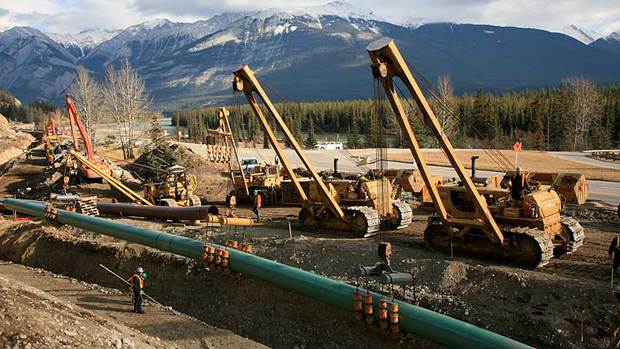
OTTAWA – Canada’s oil and gas producers are struggling to stay competitive with their U.S. counterparts because of the fight to expand pipeline capacity, says a new report from the C.D. Howe Institute.
The analysis by associate director of research Benjamin Dachis is the first in what he says will become an annual comparison of Canada’s oil and gas sector with its North American equivalents.
The report comes just days before the federal government is expected to unveil how it plans to overhaul the environmental and regulatory review process for major energy projects.
Industry expects that overhaul to be the make-or-break plan for future pipeline projects, and Dachis says the lack of pipelines to transport oil and gas to market remains the biggest factor affecting the industry’s competitiveness with the U.S.
“If Canadian governments allowed pipelines to be built expeditiously, the competitiveness of western Canadian oil producers would be greatly improved,” he wrote.
While carbon taxes are getting the lion’s share of political and public attention, they’re having little negative effect, Dachis said — and indeed, if they are well-designed, can actually create an incentive to cut emissions without affecting competitiveness.
A lack of pipeline capacity for getting product to market, on the other hand, has a significant impact, Dachis said, with estimates that the bottleneck cuts about $5 off the profits of every barrel of oil produced in an average western Canadian well.
The analysis looks only at conventional oil and gas wells and not the oilsands, the economics of which are far different and don’t compare to conventional oil wells in the U.S., he said.
“This is where a lot of emerging oil and gas investment is going,” said Dachis. “It’s where the magic is happening.”
Ben Brunnen, the vice-president at the Canadian Association of Petroleum Producers, said the C.D. Howe report is “generally consistent with what we’re seeing.”
However he thinks the report underplays the impact emissions taxes and regulations will have down the road.
Shannon Stubbs, Conservative critic for natural resources, said in a statement Thursday that investment in Canadian energy has declined substantially in the last two years and delays getting pipelines built are key reasons.
Canada has watched several pipeline projects evaporate in the last year, including TransCanada’s Energy East pipeline between Alberta and the east coast, the Mackenzie Valley gas pipeline from the Beaufort Sea and the Northwest LNG project in B.C.
Proponents in all three cases cited regulatory holdups as contributing to the demise of the projects, although regulation was only one factor.
“The regulatory process sure didn’t help, but at the end of the day, market forces probably made the decision,” Dachis said.
The plummeting price of natural gas made new pipelines less economical. In the case of Energy East, the arguments for it became less forceful when the U.S. revived the once-moribund Keystone XL pipeline.
Dachis said Keystone, the Trans Mountain expansion between Alberta and B.C. and the Enbridge Line 3 replacement comprise a lot of new capacity that would make the argument for Energy East tougher.
Trans Mountain’s expansion, which would triple the capacity of the oil pipeline, is in question again after the B.C. government proposed new limits on shipments of bitumen through the province.
The regulations could block the expansion altogether. The B.C. government opposes it, but Alberta Premier Rachel Notley has threatened to sue. She said the province is overstepping its authority and that the regulations will hurt the Canadian economy.
Federal Natural Resources Minister Jim Carr restated his government’s support for the project earlier this week. The Liberal government approved the project in 2016.
The federal Liberals have spent the last two years consulting on how to overhaul the regulatory and environmental reviews for major energy projects, arguing the process needed to be more transparent and more fair. Legislation is anticipated next week.
— follow @mrabson on Twitter